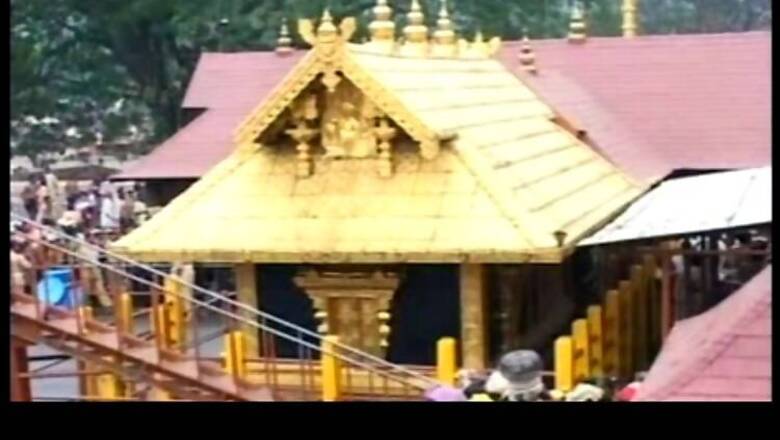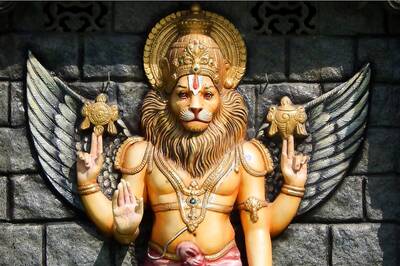
views
New Delhi: Famous Kannada actress Jayamala hit the national headlines in mid-2006 when she claimed that she had touched the idol of Lord Aiyyappa Swamy at the Sabarimala temple in Kerala. In an interview, she claimed that she had entered the sanctum sanctorum of the temple in 1986. All hell broke loose after that.
The devotees of Aiyyappa were incensed and demanded a strict action against the once glamorous Kannada actress for hurting their religious sentiments.
The Travancore Dewaswom Board which controls the administration of Sabarimala temple asked the Kerala government to file a case against Jayamala. The case was quashed by the Kerala High Court only in 2012. The court ruled that the charges against Jayamala are invalid.
The Jayamala incident led to a nationwide debate on the Sabarimala and the Delhi centric national media took it up as a big issue. After this incident, the issue of restricting entry of women in the menstruating age has been coming up for a debate regularly.
Recently, a girl called Nikita Azad launched a Facebook campaign aptly named "Happy to Bleed" demanding that the women should be allowed to enter Sabarimala temple. According to media reports it was a response to a statement by Travancore Devaswom Board president Prayar Gopalakrishnan that women should be allowed in the Sabarimala temple only after the invention of a machine to 'check the purity of women'. The campaign launched on November 21, 2015 asking women, “To hold placards/sanitary napkins/charts saying 'Happy To Bleed' and post the pictures on their profiles or the campaign page to oppose the shame game played by patriarchal society since ages.
"Devaswom chief of Sabarimala temple, Kerala has given a sexist statement that once purity checking machines are invented, that check whether it is "right time" or not, (whether women are menstruating or not) are invented, he will think about letting women enter. By this statement, he has reinforced misogyny and strengthened myths that revolve around women," the statement posted on 'Happy To Bleed' Facebook page said.
"'Happy To Bleed' is a counter campaign launched against menstrual taboos, and sexism that women are subject to through it. It acknowledges menstruation as a natural activity which doesn't need curtains to hide behind," the statement added.
The Supreme Court has once again brought the focus back on the very sensitive issue of not allowing women into the temple. It has sharply divided the public opinion. Those who are not happy with the SC asking the Kerala government to file its reply argue that the judiciary should not judge the religious beliefs as they are beyond logic and reasoning. They also feel that the judiciary should judge the beliefs of all religions, not just Hinduism, if it really wants to enforce the Constitutional rights of women.
Those who agree with the SC argue that the judiciary is right in asking questions over the discriminatory practices.
Other temple which bar the entry of women
However Sabarimala is not the only temple which prohibits the entry of women. Lord Annappa Swamy temple at Dharmasthala near Mangalore in Karnataka also prohibits the women from entering the temple. Devotees even claim that Lord Annappa is the brother Lord Ayyappa.
The famous Shani temple at Shingnapur near Shirdi in Maharashtra also prohibits entry of women into the sanctum sanctorum. Even though it has created a history by appointing a 40 year housewife Anita Shetye as the chairperson of the 500-year-old temple trust on Monday, the tradition of women not being allowed in the sanctum sanctorum would continue.
The Baba Balak Nath temple in the Dhaulagiri Hills of Hamirpur district of Himachal Pradesh also does not allow women into the temple. According to myth, women who visit the Lord Kartikeya temple in Pushkar of Rajasthan will get cursed instead of being blessed, hence there is a ban on the entry of women.
Women aren't allowed inside the Patbausi Satra temple of Assam to preserve its "purity", particularly as menstruating women are considered "unclean". In 2010, the then Assam Governor JB Patnaik decided to break the rule and he entered with some women, but the ban was re-imposed later, claim local media reports.
In a country like India which has lakhs of small and big temples, there may be several hundred temples which don't allow women into the sanctum sanctorum. Only a few big temples make news, the rest remain unnoticed.

















Comments
0 comment